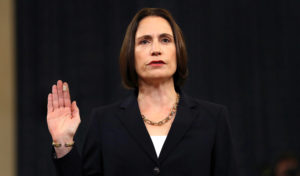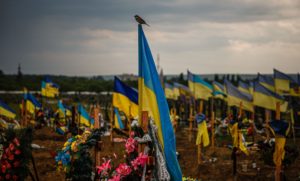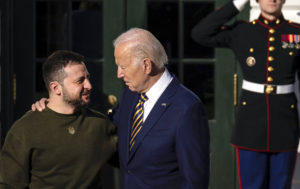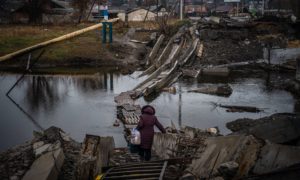It was exactly a year ago this week that, contentedly ensconced in a Cape Town hotel, I was woken in the middle of the night by an incessant pinging on my phone. Messages were pouring in from friends in Ukraine telling me that Russia’s invasion had begun. Slumbering next to me, a newspaper columnist of more refined interests was startled, after a pleasant evening, to hear me muttering and swearing about Vladimir Putin.
The insanity of Putin’s march on Kyiv shocked me. I had reported on Ukraine since March 2014, just after the war first began. I was in New Haven and watched on an oversized diner TV as men in green military uniforms without any identifying insignia walked into Crimea and hoisted the Russian flag over the Supreme Council building. Later, I listened incredulously as Putin denied they were his troops and then, yet more incredulously, as the West’s leading politicians appeared to accept this obvious nonsense. In those moments, a new era had started to dawn.
Despots are democracy’s most attentive students. Wary of becoming another Saddam Hussein or Bashar al-Assad, Putin was taking pains to coat his actions in the language of human rights and constitutional politics. More than this, he took care to avoid too much bloodshed. This was the brilliance of his Crimea operation. Everyone from the EU to Nato knew it was the Russians, but because there was no violence it made it hard for them to act, or gave them the excuse they needed not to.
But Putin had no intention of stopping with Crimea. I first arrived in the eastern Ukrainian city of Donetsk in April 2014, after local “separatists”, backed and coordinated by Russia, had seized the municipal building. Thugs in masks and baseball bats were hanging pro-Russia banners over the balcony and skulking in the central square. There were roughly 1,000 of them in this city of one million: strange for a place that I was repeatedly told was so pro-Russian.
From there I moved onto Luhansk. I was inside its municipal building when a different gallery of thugs — this time armed with automatic weapons — announced the establishment of the separatist “People’s Republic of Luhansk”. Later, in the city of Sloviansk, where “protestors” seized the police station, I saw for the first time what I was certain were Russian troops: masked and without insignia. This was, I realised, now a front line. Ukraine no longer simply faced protests in the East; it was at war with Russia.
But it was a funny kind of war. Back then, Putin had no designs on marching to Kyiv and forcing Ukraine to surrender. He swiped Crimea, which many Russians had always resented being passed to Ukraine in 1954, and then sent his troops into eastern Ukraine. But this was more about enabling the Russian media to take control of information spaces and start pouring in unfiltered pro-Kremlin narratives. It was when I first encountered a term that would come to dominate our age: “disinformation”.
Since then, this word has become problematic, not least because it has become so overused that, to echo Orwell, it has degenerated to the level of a swear word. It has also spawned an industry filled with charlatans. But if we correctly understand it as just another word for “propaganda” — often made more potent through digital technologies — then its presence in Ukraine was clear, and its effects devastating.
In Donetsk and Luhansk, people told me with utter sincerity how Kyiv wanted to ban the Russian language in the country — an impossibility even if it did, which it didn’t — and how they were coming to kill all Russian speakers. They showed me articles from Kremlin news outlets and videos from Russian TV. All of them false, some outright staged. Their effects cannot be underestimated. In July 2014, for instance, fraudulent Russian media reports, started by Putin associate Aleksandr Dugin, claimed the Ukrainians had crucified a small child in Sloviansk. It has served as a rallying cry for Russian atrocities ever since.
Ukraine was, in many regards, the laboratory for much of the behaviour we now accept as part of a public sphere: trolls, bots and fake news. “Falsehood flies, and the Truth comes limping after it,” wrote Jonathan Swift: as good a description of the current moment (and Twitter) as any I’ve ever read. Perhaps we eventually became guilty of overegging the threat. From Brexit to Donald Trump, Russian trolls became for many an excuse for everything we didn’t like. Last year’s invasion also taught the world that hybrid war has its limitations — you can’t march to Kyiv on a tweet thread; the war on the ground will always reassert itself. Those, though, who sought to dismiss the role of information entirely were also mistaken.
As information warfare has evolved, 21st-century state leadership — for autocrats and democrats alike — has evolved alongside it. When Putin, clearly chafing in his role of cuddly despot, made the decision to try to conquer Ukraine outright, he made many mistakes, but chief among them was to underestimate Ukraine’s president Volodymyr Zelenskyy. This was probably fair enough; his career before taking office was as a TV comedian. But in that lay his strength. Zelenskyy did two things. First, as so many soldiers on the front told me proudly, he didn’t run. Second, he used his professional experience to devastating effect.
In the months following February 24, Zelenskyy became perhaps the most televised man on Earth. He used humour, pathos and bathos to make Ukraine’s case, and in so doing, he created a new form of wartime leadership. He became master of what I call “digital statesmanship”: his output was short, to-the-point, informal — designed not for oratorical flourish but to go viral. And as a result, he influenced the war on the ground more than any Ukrainian general; his messaging made Ukraine’s case for a steady supply of weapons impossible for Western leaders to ignore. Zelenskyy did something remarkable: he transmuted Ukrainian soft power into hard power. Putin, meanwhile, has become little more than a polished Saddam.
The two men are now fighting it out in an arena largely of their own making. In southern and eastern Ukraine last month, I heard drones buzzing overhead while Soviet-era tanks rumbled by. This is nothing new: modern technology has always rubbed up against older weapons on the battlefield. What is new is our integrated global system which means that, for example, financial sanctions can become more targeted, while the digital revolution means that wars are now fought amid near-total data coverage. You can stream pretty much any video from anywhere now. This hasn’t brought the changes many hoped. Assad’s crimes are there to download, yet he remains in power. But the ability to influence the war on the ground through non-kinetic means has increased exponentially.
But again, within the new, the old remains. I have reported from all three fronts in Ukraine — in the South, East and North East. Conditions are varied, as are the challenges the soldiers face, but one thing is constant: the understanding that this is an existential struggle for nationhood. Putin wants to expunge the very idea of Ukraine from history. He believes it to be a fallacy. The Ukrainians hold because of many reasons, including continuing Western support, but in the end they hold because they have no choice. They are fighting for their existence. Even in the age of a supranational Europe, Ukraine shows that sovereignty and national feeling still drives peoples.
Ukraine has also taught us that Europe is no longer free of history and its perennial attendant war. Nations must be able to defend themselves. The Human Rights Act is no match for a T-90 tank. Peace is not a policy, merely something most of us want; and the only thing that guarantees it is possessing sufficient strength to deter those who want its opposite.
This is something the West seems to be learning. Part of the reason why Putin shifted from hybrid to all-out war last year was that he saw the West scuttle from Afghanistan and concluded we had no stomach left for the fight. He saw Joe Biden as old and weak, and the West as finished. In rolled the Russian tanks, only to be met by a hail of Western Javelins and NLAWs. We proved him wrong — for now. Moscow is still betting that we will falter; that Berlin will cave to the demands of German industry; that the heating bills will get too much.
Whether that happens partly depends on how long discussion over Ukraine remains charged with tropes. On the one hand, there is a rhetorical strain in politics that labels every refusal to bomb or invade “appeasement”. On the other sits its equally pernicious opposite, which labels every desire to act militarily beyond one’s narrow borders and interests as an act of warmongering. When we whacked Qasem Soleimani, and when we first started sending weapons to Kyiv, many said it would start World War Three. Well, it didn’t. In the meantime, we’ve stopped Soleimani murdering. We’ve stopped Putin conquering Ukraine and then, almost certainly, moving onto Moldova and Georgia.
But what is being decided on the battlefields of Ukraine extends far beyond them. A new Europe is emerging — one in which countries like Ukraine have become de facto garrison states against Russian aggression. We probably won’t let Ukraine join Nato, but we will arm it against external threats.
In his annual address to the Russian nation on Tuesday, Putin doubled down. “I want to repeat: it was they [the West] who unleashed the war,” he said. “And we used and continue to use force to stop it.” He also suspended Russian participation in the New Start Treaty, the last remaining nuclear arms control treaty between Russia and America. He has made it clear that, as far as he is concerned, the war will not end anytime soon.
“Sooner or later,” wrote Graham Greene in The Quiet American, “one has to take sides, if one is to remain human.” That is perhaps the final lesson of these nine years. Wars are squalid, messy things. Right and wrong can often be hard to find. But as Dominic Sandbrook eloquently argued this week, that is not the case with Ukraine. In Ukraine, a clear right faces off against an unalloyed wrong. There, they are fighting not only because it is right, but because they have no other choice. The Ukrainians — and by proxy the West — never sought this war, but it came anyway, and against it there can never be any retreat.
Disclaimer
Some of the posts we share are controversial and we do not necessarily agree with them in the whole extend. Sometimes we agree with the content or part of it but we do not agree with the narration or language. Nevertheless we find them somehow interesting, valuable and/or informative or we share them, because we strongly believe in freedom of speech, free press and journalism. We strongly encourage you to have a critical approach to all the content, do your own research and analysis to build your own opinion.
We would be glad to have your feedback.
Source: UnHerd Read the original article here: https://unherd.com/





